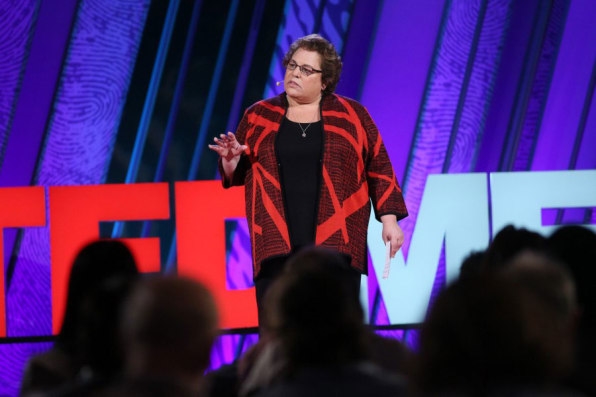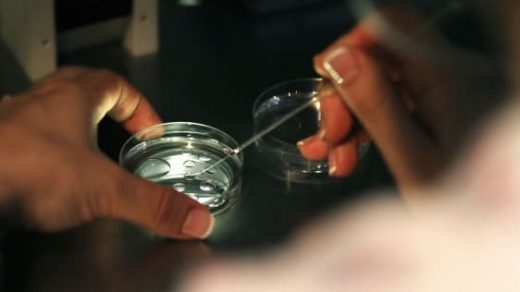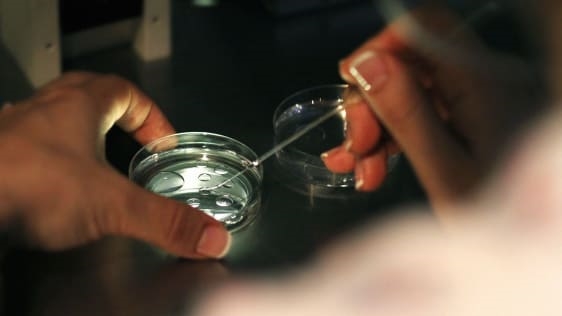This CRISPR Bioethicist Says We Worry Too Much About A Dystopian Future
CRISPR, the gene-editing technique revolutionizing biological research, has been welcomed as much as it has been feared by the scientific community. For all the awe surrounding the modification of tomato crops, there’s the unease of the Woolly Mammoth’s potential return.
Then there are the alarms rung about the future of human gene manipulation: Will society look to craft super-human “designer babies”? Will we summon a generation of blue-eyed infants with high IQs? (And while we’re at it, “edit out” the gene responsible for crying on airplanes?)
It’s highly unlikely, claims bioethicist Alta Charo, an internationally renowned leader in biotechnology and reproductive healthcare. Speaking at TEDMED in Palm Springs on Wednesday, the professor of law and bioethics at the University of Wisconsin says such extreme fears are far from reality.
Charo vividly recalls that while working in a genetics lab in 1973, another genetic technology spurred the same kind of debate when it was introduced to the public: amniocentesis. This was just a few decades after the WWII Nazi eugenics programs demonstrated the darker side of humanity’s interest in genetic research.
During that time, Charo explains, the testing of placental tissue to determine Down Syndrome was shunned by plenty of doctors and ethicists who feared, “Are we going to become impatient with imperfection? Are we, as parents, going to start seeing our children as commodities?”
“But that didn’t happen,” says Charo, “[Since then], we’ve had 50 years of responsible and useful advances in genetic screening and genetic testing, and now most recently, the promise of genetic treatment.”
In the ’80s, the same scenario arose when in-vitro fertilization was introduced: Would parents stop conceiving naturally if test-tube babies, molded for desired traits, were a possibility?
In-vitro did not usher in an era of parents demanding specific sexes or trivial traits. Instead, it’s primarily used for partners struggling to conceive or parents who wish to limit a child’s probability for inheriting a devastating genetic disease. We have not become a Gattaca-esque society simply because information is available, no matter what science fiction tries to sell us.
“In action, the choices people make and the services physicians offered were responsible and measured, and did not necessarily doom us to some kind of eugenic destiny,” stresses Charo.

Dialing Back The Panic
Likewise, it’s time to once again dial back the panic. As Charo explains, the concerns of parents creating mini-Frankensteins are mostly exaggerated. (Despite the availability of amniocentesis, for example, there are many expectant mothers over 35 who don’t even take it.)
CRISPR, meanwhile, goes far beyond screening and actually permits human germline editing. Like its predecessors, the technology has been widely debated and often vilified for its potential uses, often at the expense of its potentially life-saving benefits. Charo thinks this cultural hysteria plays into a common misconception about how much genetics really control personal identities, and what it means to “be human.”
It’s not that genes are unimportant, says Charo, just that they’re one component of what we become. Genes don’t tell us how some individuals will respond to gender, or social constructs like race or ethnicity, which differ wildly in various regions. Or even just who our family members will ultimately be. Basically, we might overestimate their role in personal characteristics.
“Genetics doesn’t tell us everything we need to know,” says Charo. “They have tremendous influence … but we don’t have to assume that by having genetic information we will abuse the choices it facilitates.”
How To Govern Individual Choices
Despite her optimism and grounded belief in humanity’s morality, Charo believes there should be legislation in place for these rapid advancements. The bioethicist wants the scientific community to adopt policies that govern individual choices–with the U.S. Constitution serving as its conscience: “First and foremost, [I believe in] the freedom to make choices for yourself,” says Charo. “In a democracy, we believe in freedom up to the point that it limits somebody else’s freedom.”
The Constitution embodies a social contract, a set of mutual obligations–that the benefits of science as well as the burdens it creates must be fairly shared by everyone, “and always with attention to the least amongst us, and always with the absolute commitment to the inherent dignity of every single person of whatever capacity,” explains Charo. (Those guidelines have yet to be hammered out.)
Overall, Charo suggests our collective fears about future reproduction may have been exaggerated, but she’s a bit more understanding regarding fears of a different nature: When I ask Charo how she personally squashes qualms about non-medical CRISPR pursuits, like say building a real-life Jurassic Park (but, sadly, without the charms of Jeff Goldblum), she acknowledges a bit more anxiety.
“I’m more nervous about that,” she relents, “because that stuff often falls through the cracks of our regulatory system.” Not that she necessarily envisions a T. rex roaming Hawaii, but she harbors concerns about other critters: “I’m worried about [CRISPR for] entertainment and artistic purposes,” she says, pointing out one such example, “like glowing rabbits.”
Fast Company , Read Full Story
(31)














